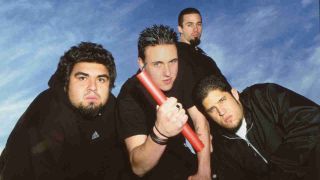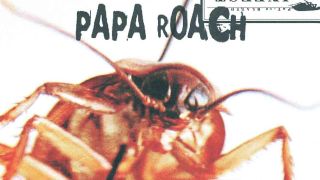Vacaville High School, California. 1993. Jacoby Shaddix and his bandmates have just played their first Papa Roach gig, at the talent show, and are convinced they have won first prize. Lined up onstage in the auditorium alongside an assortment of gymnasts, violinists and singers, in front of their parents and a hundred other onlookers, they excitedly wait for the results to be announced. This is it. They nailed it. They were better than everyone else. And then… defeat. Disappointment. Confusion. The winner is… a classically trained pianist?
“They called the other girl’s name and I was like… damn. That was my first taste of humble pie!” Jacoby laughs today over a Zoom chat from his home in Sacramento, his hairless cat Harry lurking in the background. I was like, ‘Fuck this, this is lame dude, this shit’s rigged!’ I wasn’t like Kanye West or anything and took her award, or was a dick to her, but my head hung low.”
But if we’ve learnt anything about Jacoby Shaddix over the years, it’s that nothing can keep him down. Papa Roach rallied, hustled and evolved, and seven years later would land one of the biggest hits of the 2000s with their major-label debut album, Infest. It would go on to sell seven million copies worldwide and, in Last Resort, spawn one of the most enduring songs in heavy music’s history. From a school performance consisting mainly of noise, featuring a trombone player but no guitarist, Papa Roach got off to a wobbly start, but a start nonetheless.
- Papa Roach’s Infest: Jacoby Shaddix looks back at a nu metal classic
- The 40 best nu metal songs of all time
- Every Slipknot album ranked from worst to best
- The A-Z Of Korn
“I thought we were the shit. I was delusional. We were terrible. We sounded like trash. Our songwriting was shit. But it was the beginnings,” smiles Jacoby.
Jacoby Shaddix was a sophomore when he invited new kid Dave Buckner to sit with him on the school bus, and the pair swiftly became fast friends. They both played football and drums, and ended up combining their set-ups to make one mega-kit. Conceding that Dave was the better sticksman, Jacoby bought a bass so they could jam. When it got stolen and he couldn’t afford a new one, his buddy Dave devised an ingenious solution. “Dave was like, ‘Just be a singer, man, that shit’s free!” Jacoby chuckles.
They roped in schoolfriend Will James on bass and, as it was the era of ska-punk and Jacoby played clarinet in the school band, a trombone player. Jacoby christened the quintet Papa Roach after his step-grandfather, Bill Roatch. It was a quirky name like his heroes in Mr. Bungle, and besides, a cockroach was cool. It stood for resilience. For invading. After suffering their great talent show failure, they ditched the brass section and realised they needed a guitarist, setting their sights on acquaintance Jerry Horton from nearby Vanden High School. Jerry, in the year above and with heavier tastes, needed some convincing.
“He wasn’t very interested,” explains Jacoby. “He was more into Front 242 and Slayer and Ministry and Metallica; I was into Red Hot Chili Peppers and Mr. Bungle and Fugazi and Social Distortion and shit like that. But I harassed his ass and he finally came to practice, and bam!”
Making music in their garages, hopping between them as various parents tired of the racket, the band were having fun, although football practice began to encroach on band practice. Eventually, Jacoby and Dave snapped and quit the team.
“We went to Hell Week,” says Jacoby, screwing up his face as he recalls the mandatory intensive training regime at the start of the season. “This is at a college up in Nevada, and you do two practices a day for a week straight, and it’s just brutal. I had diarrhoea the whole fucking time, because the food was terrible, and we were working our assess off. Dave and I got back and looked at each other like, ‘Fuck! I just wanna rock, dude!’”

Vacaville, population 81,000, was a stultifying place to be a teenager. Nestled between San Francisco and Sacramento, the archetypal slice of American suburbia was best known for its former onion industry (a fact Papa Roach would playfully acknowledge, self-releasing music via Onion Hardcore Records and promoting shows under the banner Onion Hardcore Productions). The band and their friends would drive to shows in the big cities, but were desperate for their own scene, and so they set about creating one.
Armed with their 1995 demo, Caca Bonita, P-Roach brought the party to local living rooms and backyards and bars, waiting in the car pack until showtime because they were underage. Vacaville’s Three Oaks Community Center allowed them to put on shows if they donated the revenue back to the city (by the time they took off, they had raised enough for a skate park).
As Papa Roach gathered speed, they began playing Sacramento venues such as The Press Club, The Cattle Club and Big Shots, flyering and pushing their demos on people. They gigged alongside Sacramento’s own Shortie and Leisure (who eventually became Middle Class Rut), Salmon from San Jose and Nuclear Rabbit from Novato. They got to open for local successes Far and Deftones. Recognition didn’t come easily, but cockiness and confidence did. “Once we started to jump out of the pond here in the small town, it was another challenge, because you’re just nobody,” remembers Jacoby. “We didn’t give a fuck, man! We would just show up to these new places and peddle our demos right off the bat. We were like, ‘What’s up? You wanna fucking check out this new Papa Roach? We’re the shit!’”
We didn’t have ‘quit’ in us. That wasn’t part of our DNA.
Jacoby Shaddix
By 1997, bassist Will James had left the band and Tobin Esperance was in. His musician father produced debut album Old Friends From Young Years, a milestone for Papa Roach, who felt like they were creeping closer to making it as a professional band – even if it was funded by a loan from a drug dealer. The following year, they headlined a landmark, 700-capacity show at the Three Oaks Community Center with support from Snot, Incubus and Human Waste Project.
“They were all LA bands, but they were starting to come up to NorCal, and they all had record deals but we didn’t,” explains Jacoby. “That was an awesome moment for us, as an independent band in Vacaville. It was the moment when we felt like, ‘Alright, I think it’s really time for us to land this deal.’”
P-Roach shopped their music to majors and independents, from Interscope and Geffen to Century Media and Roadrunner. Nothing happened. Meanwhile, fans were turning up to gigs in droves. The band pushed on and targeted Los Angeles, refusing to pay to play at the Whisky or Roxy and doing free Monday nights at The Troubadour instead. There was another EP, 5 Tracks Deep. And yet another one, Let ’Em Know. Their persistence paid off when they got a call from Jeffrey Weiss at Warner Bros, offering them a demo deal. Finally, it was happening.
Except… it wasn’t. Papa Roach recorded five songs, but Jeffrey and Warner Bros parted ways. The label passed on the band, and they were back to square one. Luckily, there was another opportunity around the corner. “I remember getting that call, and being so deflated and defeated. And then I was like, ‘Fuck it, we’re going to go on tour, we’re going to promote this thing, and we’re going to keep pushing.’ We didn’t have ‘quit’ in us. That wasn’t part of our DNA,” says Jacoby, getting riled up at the memory. “And we were mixing the demos, and this guy named Ron Handler from DreamWorks Records showed up and heard them, and fucking flipped out. Our lives changed at that point.”
Papa Roach went into Hollywood’s NRG Studios in the winter of 1999, with producer Jay Baumgardner, who had worked on debut albums for Coal Chamber, Spineshank and Dope. For Jacoby, who was a janitor at Travis Air Force Base Hospital, stripping waxed floors and incinerating boxes of body parts, the dream was finally coming true. So too for roofer Jerry, and ‘Merry Maids’ cleaners Dave and Tobin. Arriving for recording sessions, they found themselves treated like rock royalty.
“We were just po-po,” says Jacoby. “So to be able to roll up in a studio and they’re rolling out the red carpet for us, and they got the coffee hot for you, and the fruit plate, and the veggie tray, and if you wanna order food from the restaurant, you could do that? I was like, ‘Oh my god, this is amazing.’ But lo and behold, it was all the band’s money I was spending! But we got a phat-ass deal, and it was budgeted for us to spend money, and send the runner to grab a big old handle of vodka, or a box of CDs so we could trip out on some new music. I had a great time spending the money for a minute.”
The songs for Infest had been written, with a chunk already on their demos. All that remained was to commit the songs to tape with Jay. “I remember Ron telling Jay, ‘Listen, I don’t want you guys to over-produce this thing.’ Because Ron’s favourite band was Bad Brains. They just put out raw, visceral punk music. And he wanted our sound to be guitar, bass, drums and vocals. Let’s capture the energy.”
I remember breaking down in the studio, because I was exposing these vulnerable parts of myself
Jacoby Shaddix
Though not entirely unexpected in a world that had given us Korn, the lyrical content was surprisingly heavy coming-of-age stuff for a band whose singer went by the not-exactly-serious name of Coby Dick. Broken Home, a rager with a turbo-charged screaming section, was about the fallout from Jacoby’s parents’ divorce. Revenge, a quirky rap-rock track, referenced abuse he had suffered at the hands of a babysitter. Dead Cell, with its thundering, low-end riffing, questioned how the Columbine killers could have carried out such evil crimes. And, of course, there was Last Resort, a song where Jacoby put himself in the shoes of a roommate who had attempted suicide. It was somehow catchy enough to become a club banger, and honest enough to become an anthem of hope.
By the time it came to recording, Jacoby had been singing the songs live for so long that he was almost numb to their meanings, and instead was hyper focused on trying to sound his absolute best. It was up to Jay to pull an emotional performance out of him.
“Jay was really helpful to me, to be able to tap into those emotions and let those feelings out,” Jacoby says. “I remember breaking down a few times in the studio, because I was out of my comfort zone, underneath a microscope and exposing these vulnerable parts of myself in the music. It’s an ebb and flow between the emotion, and then trying to be perfect. And I realised, fuck perfection. Really. You’ve just gotta be raw and fucking real.”
Infest was released in the US on April 25, 2000. Less than two months later, it had sold 500,000 copies, earning Gold status. Much of its success was down to airplay; Papa Roach had done a showcase gig at San Francisco’s Maritime Hall back in February, attracting a huge amount of radio industry attention for Last Resort. The memorable video, featuring fans in their bedrooms, was in heavy rotation on music television. On the road, their audiences were increasing by the day. “We were like, ‘We’re just gonna get in the van, and we’re gonna tour, and we’re gonna sell 100-150,000 records, 200,000 maybe,” remembers Jacoby. “All of a sudden, we’re selling 150,000 records a week. And throughout the year… it was madness. We never came home. We just toured, and toured, and toured, and didn’t stop touring.”
Their first significant stint was on the legendary Warped Tour, starting on June 23 in Fresno, California. So chaotic was the crowd at the smallest stage that organiser Kevin Lyman immediately bumped them up. For Papa Roach, it was also an education in “learning what rock’n’roll is all about”, competing in the Beer Pong Olympics with Flogging Molly, Suicide Machines and Green Day as the punk rock summer camp rolled through state after state.
“I remember one night, everybody’s partying and this chick comes around, and she’s like [puts on girl’s voice], ‘Can I get the band’s autographs?’ And we’re like, ‘Alright’,” shrugs Jacoby. “We’re doing the autograph deal, and then she was like, ‘Now I wanna give you my autograph.’ She pulls her skirt up, puts the Sharpie in her butt, squats down on a piece of paper and tries to write her name. That is etched into my memory until forever!”
The drinking and the partying carried on to a point where it was starting to really take its toll on me
Jacoby Shaddix
At the tail end of Warped, prime time beckoned. Conan O’Brien in July; David Letterman in August; Jay Leno in October. Alongside Hollywood celebrities such as Kevin Spacey, Halle Berry and Mary Tyler Moore, Papa Roach were beamed into millions of households across the nation – not bad for a bunch of schoolkids who’d slogged it out in Onionsville for years. Metal had hit the mainstream, and by October they were on the Anger Management tour with Limp Bizkit and Eminem. They went out with Korn, and they did their own headliners. It was a whirlwind; everything they had ever wanted had come true. There were private jets, girls and all the trappings of celebrity – but Jacoby was not prepared for it. Two years of touring and promoting Infest hit like a ton of bricks.
“I didn’t know how to handle fame,” he confesses. “The drinking and the partying and nonsense that I was living just carried on to a point where it was starting to really take its toll on me. I was married, but I wasn’t living like I was married. And the guilt and the shame from that really weighed heavy on me. And I thought, ‘At the end of this whole fucking rollercoaster, I’m gonna go home and I’m gonna come back down to Earth’, and I didn’t.”
Jacoby’s now-well-documented battle with alcoholism continued, and it wasn’t until the end of the touring cycle for 2002’s Lovehatetragedy that he began his journey to sobriety. Today, he sighs with relief and gratitude as he tells us he hasn’t picked up a drink for eight years. The making of Infest was a wild ride, but he’s incredibly proud of how it’s sustained the band and cut across generations.
“It’s still one of my favourite records to listen to,” he reveals. “And I think that honestly, that album is the reason we’re still doing it. Having Infest in our catalogue affords us the opportunity to keep recording. In particular, Last Resort, Between Angels And Insects and Broken Home, they still stream like fucking crazy. Kids are discovering our band through Last Resort. What? Wow! It trips me out. It’s definitely a timeless classic.”
Published in Metal Hammer #337
- These are the rock’n’roll Face masks we’ll be wearing to stay safe
- Own your idols with the best Funko Pop! Rocks vinyl figures
- Here are the best turntables right now
- On a budget? Here are the best budget turntables
- The best bluetooth speakers you can buy right now
- Best headphones for music: supercharge your music listening
- The best budget wireless headphones: wire-free and wallet-friendly
- Best in-ear headphones: Louder’s top choice wired and wireless earbuds
- The best wireless headphones you can buy right now
- Block out noise with the best budget noise-cancelling headphones
- Take a look at the best true wireless earbuds




